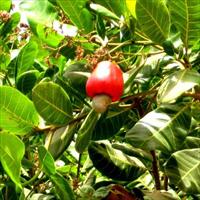SENEGAL: High cashew prices benefit rebels

The soaring price of cashew nuts in Senegal’s restive southern region Casamance is lining the pockets of armed rebels according to Ismaïla Diédhiou, an agricultural expert who works at the local development association ASPRODEB.
“Insecurity has also risen in the forests where cashews are grown towards the Guinea-Bissau border, which has benefited the rebels who collect the nuts themselves to sell them on in Ziguinchor and Guinea-Bissau,” Diédhiou said.
Since March the price of cashews has shot up from 29 US cents per kg to 94 US cents now to reach “the highest price in ten years,” said producer Aliou Coly. The price rise was caused by a small harvest, improved quality of the nuts, and the removal of fixed prices, according to experts.
Damien Manga, a member of the rebel group the Movement of Democratic Forces in the Casamance (MFDC) confirmed that rebels benefit from selling cashew nuts.
But he says they only use the money to cover their living expenses – not to buy the weapons they have allegedly used in a series of attacks on civilians over the course of this year.
In May 2008 the MFDC were allegedly involved in slicing off the ears of up to 20 peasant farmers who had ignored a warning from the rebels to stop selling cashews.
“We collect cashew nuts to sell like everyone else. It is through cashew nuts that we can afford to buy clothes or shoes and take care of our daily needs,” he said, adding “[This year] I got over a tonne of nuts, which meant I could repair my motorbike,” Manga said.
“Some say [selling] cashews or cannabis enables us to buy weapons. This is false… it is only our leaders who buy our weapons.”
Manga blamed violence near cashew orchards on the Senegalese military which has a heavy presence in the break-away region, claiming they too profit from the cashew trade.
Lieutenant Malamine Camara, Senegalese military spokesperson in Ziguinchor, denied the allegation.
“Our mission is to ensure the safety of people and goods in this region. We never engage in profit-making activities, and we execute our mission by the rules,” he said.
While a handful of farmers and rebels are profiting from the high prices, for the peasants who are too afraid to access their land, 2008 is as bad a year as any other.
“Most of our orchards are on land that is exploited by the rebels. We still don’t dare go there because of the landmines and the armed men,” producer Bacary Sane, who owns trees near the Guinea-Bissau border, told IRIN.
 Back and Next - Back and Next
Back and Next - Back and Next See Also - See Also
See Also - See Also